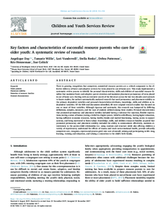Abstract
There is growing recognition that competent, committed resource parents are a critical component to the effective delivery of foster and adoptive services for teens placed in out-of-home-care. This study implemented a systematic review process to identify the personal characteristics, skills and abilities of successful resource families that maximize foster and adoptive parent retention and maximize placement permanency of teens placed in out of home care. Starting with an extensive search of the literature across the last two decades and outreach to locate studies, the authors systematically analyzed research that used permanency and placement stability as the primary dependent variables and personal characteristics/attributes, knowledge, skills and abilities as in- dependent variables. Of the 838 total documents identified, 48 were original research studies that focused on one or more of these variables. Although rigorous and systematic, this research was hampered by differing definitions, samples, measures, and the type of analysis utilized among these studies. Personal characteristics that promoted permanency and placement stability included having a tolerance for rejection, flexible expecta- tions, having a sense of humor, having a belief in a higher power, belief in self-efficacy, having higher education, having sufficient economic resources, having healthy family and marital functioning, having access to support systems, and being motivated to foster/adopt. Knowledge, skills, and abilities resources families acquired that promoted permanency and placement stability included the ability to communicate effectively, maintain at- tentiveness to the parent/child relationship (i.e. using routines and structure while also offering children a variety of experiences), understand the effects of trauma and teach socio-emotional health, provide culturally competent care, recognize, express and process grief, take care of oneself, valuing and participating in life -long learning, training and education, and valuing a connection to the child's birth family.

